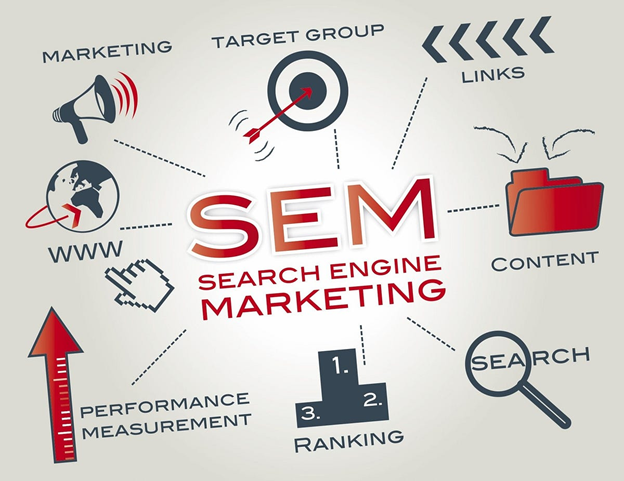Content
SHARE

As a small business owner, you’re likely always on the lookout for ways to reach a wider audience and grow your business. One effective way to do this is through search engine marketing (SEM). But what exactly is SEM and how can it benefit your small business? Let’s delve into the details.
Understanding Search Engine Marketing
Search engine marketing is a digital marketing strategy used to increase the visibility of a website in search engine results pages (SERPs). While the industry term once referred to both organic search activities such as search engine optimisation (SEO) and paid, it now almost exclusively refers to paid search advertising. SEM, also sometimes known as pay-per-click (PPC) marketing, involves the promotion of websites by increasing their visibility in search engine results pages through optimisation and advertising. This can be achieved through paid ads, use of specific keywords, and a variety of other techniques.
Source: Thakur, M. (2021, December 12). Why is SEM important for small businesses and startups? Medium.
The Importance of SEM for Small Businesses
SEM can be particularly beneficial for small businesses for a number of reasons. First and foremost, it can significantly increase your online visibility. This is crucial in today’s digital age, where the majority of consumers turn to search engines like Google when looking for products or services. Furthermore, SEM allows for targeted advertising. This means you can reach your ideal audience – those who are most likely to be interested in your products or services – more effectively. This can lead to increased traffic to your website, more leads, and ultimately, more sales.
Implementing SEM in Your Small Business
Now that we’ve covered what SEM is and why it’s important, let’s look at how you can implement it in your small business.
Source: Conductor. (2023, June 22). What is Keyword Research? A Complete Guide.
Keyword Research
Keyword research is a crucial part of SEM. This involves identifying the words and phrases that people are using when they search for products or services similar to yours. These keywords can then be used in your website content and ads to help increase your visibility in search engine results. There are a number of tools available that can help with keyword research, including Google’s Keyword Planner. This tool can provide you with information on the popularity of certain keywords, as well as suggestions for new keywords you might not have considered.
Creating Effective Ads
Once you’ve identified your keywords, the next step is to create effective ads. These should be compelling and relevant, with a clear call to action. Remember, the goal is not just to attract visitors to your website, but to convert these visitors into customers. It’s also important to consider the structure of your ads. Google AdWords, for example, allows for a headline, two lines of text, and a URL. Make sure to utilise all of these elements to create an ad that is engaging and informative.
Monitoring and Optimising Your Campaigns
Finally, it’s crucial to monitor and optimise your SEM campaigns. This involves tracking the performance of your ads and making adjustments as necessary to improve results. This could involve tweaking your ad copy, adjusting your bid amounts, or changing your target audience. Again, there are tools available that can help with this. Google Analytics, for example, can provide you with detailed information on how your ads are performing, including click-through rates, conversion rates, and more.
Conclusion
Search engine marketing can be a powerful tool for small businesses. By increasing your visibility in search engine results, you can reach a wider audience, attract more visitors to your website, and ultimately, grow your business. However, like any marketing strategy, SEM requires careful planning and execution. By conducting thorough keyword research, creating effective ads, and monitoring and optimising your campaigns, you can make the most of your SEM efforts and see real results for your business.
Frequently Asked Questions About Search Engine Marketing
Why is SEM Good for Business?
SEM campaigns help with brand visibility and awareness much more quickly than an SEO strategy focusing on raising your page rank results in the search engine as such a strategy will only yield results after months of work.
What is the Average Budget for SEM?
Search engine marketing costs typically range from RM3,000 to RM10,000 each month. But there’s more to it than you might think.
Is SEM More Expensive Than SEO?
SEO costs more than SEM in the short-term. SEO doesn’t cost money in the way that SEM ads cost per engagement, but to achieve organic visibility, organisations must invest a lot of time and effort into SEO.
What is the SEM Strategy for 2024?
In 2024, companies must focus on personalisation, voice search optimisation, video marketing, local search optimisation, mobile optimisation, social media integration, and analytics and tracking to ensure their SEM strategy is effective.














